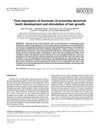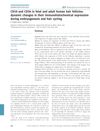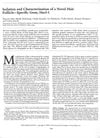 44 citations,
June 2006 in “Biological & Pharmaceutical Bulletin”
44 citations,
June 2006 in “Biological & Pharmaceutical Bulletin” Androgen hormones cause hair follicle scarring in hair loss, and finasteride helps reduce it.
 40 citations,
August 2022 in “Frontiers in immunology”
40 citations,
August 2022 in “Frontiers in immunology” Blocking JAK/STAT pathways can help treat hair loss from alopecia areata.
 39 citations,
June 2019 in “Toxins”
39 citations,
June 2019 in “Toxins” Bee venom might be a good alternative treatment for various skin conditions because it has many healing properties.
 39 citations,
October 2013 in “Plastic and Reconstructive Surgery”
39 citations,
October 2013 in “Plastic and Reconstructive Surgery” Human alpha defensin 5 helps heal wounds, reduce bacteria, and grow hair on burned skin.
 39 citations,
August 2008 in “Growth hormone & IGF research”
39 citations,
August 2008 in “Growth hormone & IGF research” Raspberry ketone may help grow hair and improve skin elasticity.
 39 citations,
March 2003 in “The Veterinary clinics of North America. Small animal practice/Veterinary clinics of North America. Small animal practice”
39 citations,
March 2003 in “The Veterinary clinics of North America. Small animal practice/Veterinary clinics of North America. Small animal practice” Behavioral dermatology treats skin problems by considering both emotional and physical factors.
 38 citations,
December 2012 in “Journal of Cutaneous Pathology”
38 citations,
December 2012 in “Journal of Cutaneous Pathology” EVG staining is a valuable, simple, and cost-effective method for diagnosing various skin conditions in dermatopathology.
 38 citations,
May 2006 in “Archives of Gynecology and Obstetrics”
38 citations,
May 2006 in “Archives of Gynecology and Obstetrics” Women with only irregular periods or excess hair have a better hormone profile than those with full PCOS, but both groups are similar, indicating a need for better PCOS diagnosis methods.
 36 citations,
November 2018 in “BMC plant biology”
36 citations,
November 2018 in “BMC plant biology” ROXY proteins help plants respond to nitrate shortage by affecting nutrient sensing and growth.
 36 citations,
March 2002 in “Journal of Biological Chemistry”
36 citations,
March 2002 in “Journal of Biological Chemistry” Food deprivation increases MST enzyme in the brain, possibly affecting energy balance.
 35 citations,
October 2017 in “Signal Transduction and Targeted Therapy”
35 citations,
October 2017 in “Signal Transduction and Targeted Therapy” Fibromodulin treatment helps reduce scarring and improves wound healing by making it more like fetal healing.
 35 citations,
January 2011 in “Clinical Endocrinology”
35 citations,
January 2011 in “Clinical Endocrinology” Metformin should be used for PCOS mainly in those with glucose intolerance, and has limited benefits for infertility or hirsutism.
 34 citations,
December 2009 in “The International Journal of Developmental Biology”
34 citations,
December 2009 in “The International Journal of Developmental Biology” Too much thymosin beta4 causes weird teeth and more hair growth in mice.
 33 citations,
November 1994 in “Archives of Biochemistry and Biophysics”
33 citations,
November 1994 in “Archives of Biochemistry and Biophysics”  32 citations,
December 2017 in “International Journal of Molecular Sciences”
32 citations,
December 2017 in “International Journal of Molecular Sciences” Low vitamin D might be linked to certain types of hair loss, and supplements could help, but more research is needed.
 28 citations,
November 2019 in “Gene”
28 citations,
November 2019 in “Gene” The ITGB6 gene is important for tissue repair and hair growth, and mutations can lead to enamel defects and other health issues.
 28 citations,
January 2016 in “Vitamins and hormones”
28 citations,
January 2016 in “Vitamins and hormones” Thymosin β4 helps improve skin healing and reduce scarring.
 28 citations,
May 2015 in “Addiction Biology”
28 citations,
May 2015 in “Addiction Biology” Prenatal stress changes how male and female rats enjoy rewards differently, linked to sex hormones.
 28 citations,
January 2012 in “Biological & pharmaceutical bulletin”
28 citations,
January 2012 in “Biological & pharmaceutical bulletin” Hairless protein can both repress and activate vitamin D receptor functions, affecting gene regulation.
 27 citations,
April 2017 in “British Journal of Dermatology”
27 citations,
April 2017 in “British Journal of Dermatology” Hair loss involves immune responses, inflammation, and disrupted signaling pathways.
 27 citations,
August 2006 in “Laboratory Investigation”
27 citations,
August 2006 in “Laboratory Investigation” SCF and ET-1 together significantly increase skin pigmentation and melanin production.
 27 citations,
April 1992 in “Biochemical Journal”
27 citations,
April 1992 in “Biochemical Journal” Minoxidil reduces lysine hydroxylase in skin cells.
 26 citations,
December 2016 in “Pharmacology & Therapeutics”
26 citations,
December 2016 in “Pharmacology & Therapeutics” New drugs for heart disease may be developed from molecules secreted by stem cells.
 25 citations,
March 2014 in “Experimental Dermatology”
25 citations,
March 2014 in “Experimental Dermatology” Leptin helps start the growth phase of hair.
 25 citations,
July 2008 in “British Journal of Dermatology”
25 citations,
July 2008 in “British Journal of Dermatology” CD10 and CD34 levels change during hair development and different hair growth stages, which could be important for hair regeneration treatments.
 25 citations,
May 1994 in “Journal of Investigative Dermatology”
25 citations,
May 1994 in “Journal of Investigative Dermatology” Researchers found a new gene, hacl-1, that is active in mouse hair follicles during hair growth and may be important for hair biology.
 24 citations,
January 2013 in “Indian Journal of Dermatology, Venereology and Leprology”
24 citations,
January 2013 in “Indian Journal of Dermatology, Venereology and Leprology” Hormonal treatment is effective for women with acne not helped by usual treatments, especially if they have hormonal imbalances.
 24 citations,
January 2003 in “Journal of Investigative Dermatology”
24 citations,
January 2003 in “Journal of Investigative Dermatology” Blocking a specific receptor slows down hair loss in mice.
 23 citations,
January 2014 in “Molecular Therapy”
23 citations,
January 2014 in “Molecular Therapy” Applying a special DNA plasmid to the skin can make it thicker and stronger.
 23 citations,
March 1994 in “Fertility and sterility”
23 citations,
March 1994 in “Fertility and sterility” Most patients improved with oral contraceptives, but some needed additional treatment.






























